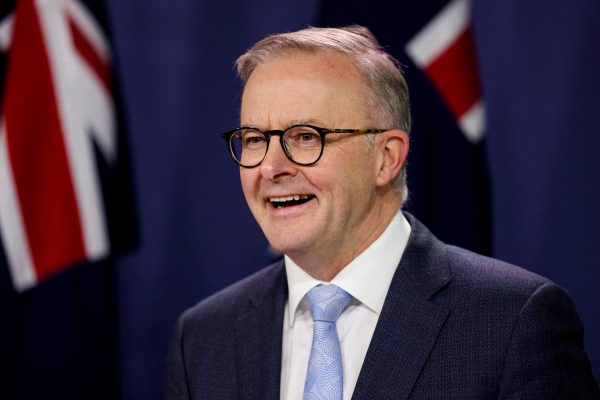One of the wilder claims made during the election campaign was that a vote for the ALP would be a vote for China. Perhaps conscious of the dangers of such claims, the Albanese government has said over and over again that there is no change of substance in its policy on China. It explicitly states that the only changes will be in tone and that it will continue to stand up for Australia’s national interests. But according to Defence Minister Richard Marles, the ‘change of tone matters’.
The diplomatic freeze between Australia and China ended in June 2022 with the defence ministers of both countries meeting in Singapore and the ministers for foreign affairs meeting soon after in Indonesia. These meetings were presented as ‘stabilising the relationship’ and ‘being professional and understanding the power of diplomacy’.
The new government appears to be treating the China relationship carefully and cautiously. The change has been of style, but it is one that has reopened channels of communication. By contrast, the change in climate policy has been one of substance.
The new government’s election commitments included an emissions reduction target of 43 per cent below 2005 levels by 2030, investment in solar banks and community batteries, rewiring of the energy grid and the promotion of clean energy exports and electric vehicles. Less than a month after the election, Australia notified the United Nations of its revised emissions reduction goal.
The change in climate policy has transformed Australia’s relations with Pacific Island countries. One clear difference is between the last in-person Pacific Islands Forum Leaders’ Summit in 2019 and the one held in 2022. In 2019, Australia was heavily criticised by Pacific leaders for watering down the language in the final communique. Tuvalu’s Prime Minister Enele Sopoaga said Australia’s ‘Pacific Step-up’ initiative would ‘not mean anything … unless we deal with the issue of climate change’.
At the 2022 summit, Australia embraced stronger language on ‘the current climate emergency’ and backed Vanuatu’s bid to seek a legal opinion from the International Court of Justice on damage caused by climate change. Pacific leaders welcomed Australia’s new emissions reduction targets and supported Australia’s proposal to co-host a future UN Conference of the Parties. Commentators noted that the new Prime Minister ‘brought a refreshing change in Australia’s tone and attitude to the forum’ and a palpable sense of greater alignment.
While Australia’s new stance has created a desired reset in relations, Australia should expect continuing pressure to increase its green ambitions — especially on the speed of its transition away from fossil fuels. The Albanese government will have to live up to the ‘Pacific family’ rhetoric inherited from the previous government and pursue Pacific diplomacy based on mutuality and respect.
In Southeast Asia — another key region for Australia — the changes have been more in tone than substance. Time will tell what effect the change in messaging will have.
Southeast Asian leaders have not responded well to past efforts to paint binary choices — such as being for or against an ‘arc of autocracy’ — at times chiding Australia for its lack of nuance. Minister for Foreign Affairs Penny Wong de-emphasised the idea of Southeast Asia as a ‘theatre of great power competition’ in her recent visits and committed to respond to Southeast Asia’s priorities.
Wong spoke of a strategic equilibrium in which ‘countries are not forced to choose but can make their own sovereign choices, including about their alignments and partnerships’. She also painted Australia and Southeast Asia as partners in building a shared future. It remains to be seen whether this change in tone will increase Australia’s attractiveness to the region, or whether changes in substance will be needed.
When it comes to trade, some degree of continuity would be expected with Minister of Trade and Tourism Don Farrell new to the portfolio. Early media releases stress perennial aims like achieving ‘outcomes that advance Australia’s national interests, bolster the rules-based multilateral trading system and deliver business opportunities’.
The Minister showed continuity at the WTO Ministerial Conference by chairing the Cairns Group meeting, a group of free-trading agricultural exporters formed in 1986. There have been bilateral meetings with India and the European Union to progress free trade negotiations and with the United States around the Indo-Pacific Economic Framework. Canberra also worked with Pacific partners, especially Fiji, to secure a new global fisheries subsidies agreement to help curb overfishing.
These actions show that the new government — with its clear focus on Australia’s immediate region — is also alive to the wider global context and using multilateral forums to progress its agenda.
With the exception of climate policy, the new Albanese government has exhibited more of a change in tone than in substance. But as Gyngell points out, tone matters in diplomacy, and can deliver changes in substance over time. Although the Albanese Government is only 100 days into its term, it is showing a commitment to diplomacy that suggests this will be much more central to the new government’s agenda.
Melissa Conley Tyler is Executive Director of the Asia-Pacific Development, Diplomacy & Defence Dialogue (AP4D).

